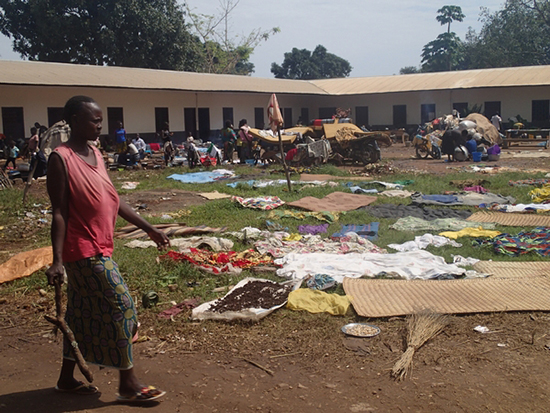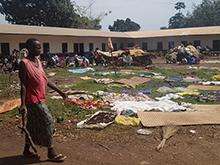Urgent need for increased humanitarian assistance amid scenes of burnt villages, brutal attacks; displaced without shelter, food, water; health system further strained.

CAR 2013 © MSF
People displaced by violence have settled in a makeshift camp in Bossangoa.
NEW YORK, OCTOBER 16, 2013—Tens of thousands of people have fled a new wave of attacks and ruthless killings by armed groups and government forces in northwestern Central African Republic (CAR), the international medical humanitarian organization Doctors Without Borders/Médecins Sans Frontières (MSF) said today.
More than 30,000 people are displaced in the town of Bossangoa, and thousands in surrounding areas. All are living in precarious conditions with limited or no access to shelter, clean water, food, and sanitation. MSF calls for all armed groups to respect the safety of civilians, medical staff, and aid workers, and for an urgent increase in humanitarian assistance.
"In the last month, we have treated more than 60 people in Bossangoa—including women and children—for injuries that are the result of violence, largely gunshot and machete wounds," said Erna Rijinierse, an MSF surgeon. "More than 80 percent of surgeries have been for wounds that are conflict-related. We are horrified by what we are seeing, including burnt villages and appalling scenes of murder. Those who are fleeing are in desperate need of assistance, as well as the sense of protection that the presence of aid agencies can bring," she said.
MSF has received numerous firsthand accounts of attacks based on religious identity. In one incident, armed men reportedly executed eight people who were separated from a larger group fleeing by truck. In another, two men were targeted and killed in a village, prompting many of their coreligionists to take flight.
In this climate of fear and violence, people are fleeing for their lives into the bush or gathering in large groups to seek safety. In Bossangoa, an estimated 28,000 people are sheltering in a Catholic mission, far exceeding its capacity. Other nearby displaced groups include 1,000 people seeking shelter next to an airstrip, about 400 people in a school and 1,200 people in a hospital, effectively turning half of the building into a makeshift camp.
As the rainy season continues, displaced people are particularly at risk of contracting malaria—the number one killer in CAR—and other diseases.
MSF special report (July, 2013): CAR: Abandoned to its Fate?
"People have no shelter and they sleep wherever they can, inside the church, school, or under trees," said Ellen Van der Velden, MSF head of mission in CAR, following a visit to the displaced persons sites. "It is crowded, and people cook, eat, sleep, wash, and defecate in the same area. Under these disastrous hygienic conditions, the risk of disease outbreaks is high."
Armed conflict has been reported in recent weeks in Bouca and Garga in northwestern CAR and Mbaiki in the southwest of the country. In Bouca, MSF continues to assist 400 families who have been living in one compound since their houses were burned down in September. In all its facilities, MSF treats people based on medical need, regardless of political, religious, or any other affiliation.
Civilians, medical staff, and humanitarian workers have all been subject to physical aggression and attack. MSF has directly witnessed the execution of a local health worker, as well as multiple violent attacks on other humanitarian personnel.
CAR has experienced decades of political-military conflict that have caused a chronic humanitarian and health emergency. Following the March 2013 coup d'état led by the Seleka rebel alliance, the situation has deteriorated even further as deadly clashes between armed groups and government forces continue in different areas of the country.
The conflict exacerbates a health system already suffering from a lack of qualified staff and few public facilities outside the capital. Shortages of essential medicines are frequent and many people cannot afford to pay fees required for treatment.
With a large proportion of the country’s population unable to access even the most basic health care, mortality rates are above emergency levels.
MSF is currently one of the few aid organizations working in conflict-affected areas of CAR, providing health care including surgery, water and sanitation, and nutritional support. However, much more aid is urgently needed, MSF said.
MSF has worked in CAR since 1996. It operates six medical programs in Paoua, Carnot, Zemio, Boguila, Batangafo, and Kabo Ndélé, and recently initiated emergency activities in Bossangoa, Bria Bouca, and Gadzi. At the end of 2012, MSF had 1,300 staff members in the country.




